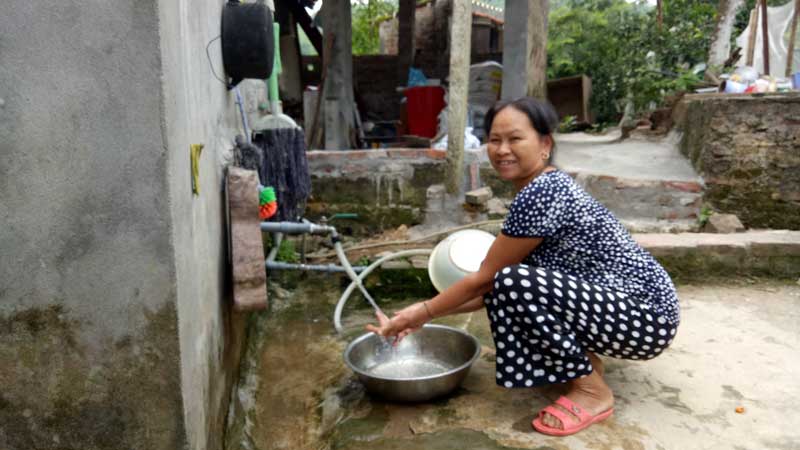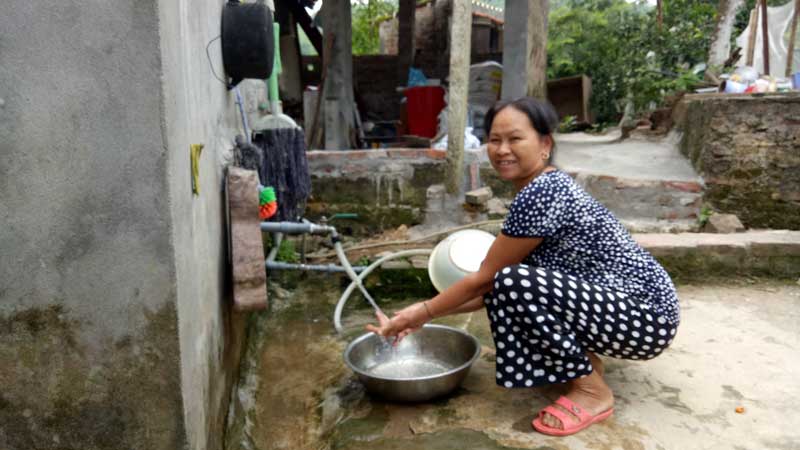
(HBO) – Yen Mong commune has implemented eight social policy credit programmes providing local villagers soft loans with total outstanding debt of more than 8.7 billion VND with 482 borrowers.

Provided with soft loans by the Bank
for Social Policies of Hoa Binh city, Nguyen Thi Lam and her family in Moi Mit
village, Yen Mong commune had money to build their own clean water supply and
sanitation facilities, improving their living conditions.
Among projects provided with soft loans under the eight social
policy credit programmes, those in clean water supply and environmental
sanitation have received over 4.6 billion VND, or 52.9 percent of the total
outstanding debt, the highest level. More than 1.8 billion VND went to production
and business projects while job creation programmes have been offered about 700
million VND.
Overdue debts accounted for 0.08 percent of the outstanding debts.
The savings deposits by the credit programmes’ beneficiaries were worth nearly
500 million VND.
The commune has 14 groups responsible for verifying local
applicants for soft loans and supervising the use of loans.
To promote the effective use of the provided soft credit, the Bank
for Social Policy in Hoa Binh city has coordinated with local authorities and mass
organisations to review poor and near-poor households and policy beneficiary
families in need of loans and assess if they are qualified.
The city has not only offered preferential loans for people to
expand production but also organised training courses on farming techniques for
new crops and livestock and applying technology in agriculture. Local people
have been also encouraged to attend short-term vocational training courses to
equip themselves with knowledge and techniques to improve productivity.
The State’s preferential loans have fundamentally met the credit
demand of local people, Chairman of Yen Mong commune’s People’s Committee
Nguyen Huu Minh said.
The loans have helped create jobs for thousands of villagers, thus
lifting them out of poverty and improving their housing conditions. In
addition, they have enabled more local students to pursue higher education, he
added.
By the end of 2018, the commune’s poverty rate fell to 2.1 percent
and the per capita income reached 40 million VND per year./.
The emulation movement "Hoa Binh joining hands to build new-style rural areas” has been widely spreading, becoming a driving force that motivates the localities to renew rural landscapes and improve the material and spiritual lives of the residents. In this movement, the people play a central role-both as the main implementers and direct beneficiaries of its outcomes.
In response to the global digital revolution, Hoa Binh Newspaper is transforming itself into a modern and multi-platform media hub, blending cutting-edge technology with a restructured newsroom and a new generation of tech-savvy journalists.
Hoa Binh province’s Association of the Elderly recently held a conference to review the project on expanding the inter-generation self-help club model until 2025.
In a move to implement Resolution No. 57-NQ/TW, issued on December 22, 2024 by the Politburo, which targets breakthroughs in science-technology development, innovation, and digital transformation, the Hoa Binh provincial Department of Health has issued a plan to roll out the "Digital Literacy for All” campaign within the local health sector.
An Nghia Commune (Lạc Sơn District) is one of the communes that achieved the tha standard of the national new rural area in 2018. Entering a new development phase, the commune is now trying to meet the criteria for the advanced new rural development. With the strong political will and the public consensus, the commune is gradually overcoming the challenges to reach this goal, aiming for the sustainable development.



